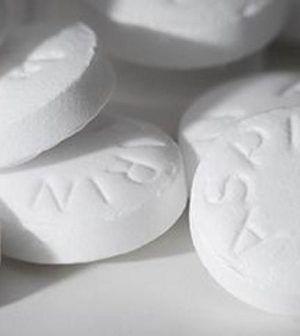- Recognizing the Signs of Hypothyroidism
- 10 Strategies to Overcome Insomnia
- Could Artificial Sweeteners Be Aging the Brain Faster?
- Techniques for Soothing Your Nervous System
- Does the Water in Your House Smell Funny? Here’s Why
- Can a Daily Dose of Apple Cider Vinegar Actually Aid Weight Loss?
- 6 Health Beverages That Can Actually Spike Your Blood Sugar
- Treatment Options for Social Anxiety Disorder
- Understanding the Connection Between Anxiety and Depression
- How Daily Prunes Can Influence Cholesterol and Inflammation
Low- or High-Dose, Aspirin Brings Similar Protection Against Heart Disease: Study

When it comes to taking a daily aspirin to cut heart patients’ risk of heart attack and stroke, a new study finds dosing doesn’t matter.
Researchers looked at more than 15,000 heart disease patients at 40 health centers across the United States who took either 81 milligrams (mg) or 325 mg of daily aspirin for a median of 26.2 months.
Though there were no significant differences between the two doses in terms of safety or effectiveness, patients taking the higher dose were much more likely to switch doses during the study.
Patients in the higher dose group were also slightly more likely to stop taking aspirin for a number of reasons, including intolerance and their own and health care providers’ preferences, according to the study presented at the American College of Cardiology (ACC) virtual annual meeting and published simultaneously on May 15 in the New England Journal of Medicine.
“We found that both doses had similar effectiveness and safety, and while there were differences in dose switching between the groups, generally patients with heart disease should take low-dose aspirin given its tolerability and no clear benefit with higher doses of daily aspirin,” lead investigator Dr. Schuyler Jones, from the Duke Clinical Research Institute in Durham, N.C., said in an ACC news release.
Heart disease is the leading cause of death for men, women and most racial and ethnic groups in the United States. Millions of Americans with heart disease take aspirin to reduce their risk of heart attack and stroke.
But even though this treatment has been used for decades, there’s been a lack of definitive research on which doses provide the greatest benefits for patients and minimize potentially serious side effects, such as major bleeding, the researchers noted.
More information
The U.S. National Library of Medicine has more on aspirin and heart disease.
SOURCE: American College of Cardiology, news release, May 15, 2021
Source: HealthDay
Copyright © 2026 HealthDay. All rights reserved.










